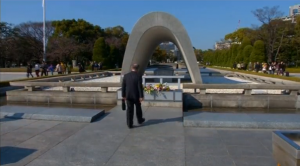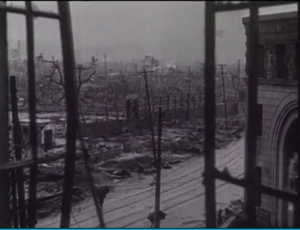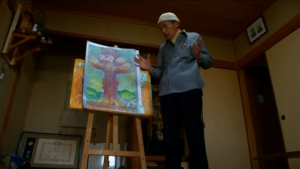
(Reuters) — Almost seventy years since the atomic bombing of Hiroshima, the ageing survivors of the world’s first nuclear attack on a civilian population are starting to worry about the legacy they are leaving behind.
Seventy-five-year-old Hiroshi Harada still remembers how his leg sank into one of the bodies blocking a narrow Hiroshima street 70 years ago as he fled the spreading fire ignited by the atomic bombing.
Later that day, a girl grabbed Harada, who had just turned six years old, by the leg and asked for water. He stepped back in horror to find a chunk of flesh from her hand sticking to his leg.

As the 70th anniversary of the Hiroshima attack nears, many survivors still find the memories too painful to talk about. However, with their ranks dwindling, others, such as Harada, are determined to pass on their experiences to younger generations.
“The atomic bomb survivors are getting older and fewer in numbers. But if one doesn’t convey the experiences that one had actually been through, then there’s no way that it can get across to most people. So I think it’s necessary to continue, to keep talking,” Harada said.
“As long as the earth still exists, as long as there’s still war, as long as the use of nuclear weapons is still an option then we have to continue to pass down our experiences. I think that’s Hiroshima’s fate,” he added.
Hiroshima survivors often refrain from talking about their experiences even with their own children, some from a feeling that the past is too horrific and others from fear of discrimination against themselves and their offspring.
Makiko Kato, an 85-year-old who was hit by the explosion just 1.2 km (0.8 miles) away from ground zero, is one of those survivors. She has led her life without ever telling her children or grandchildren what she went through.
“But recently I have begun to think I need to tell them (her children) because, at this age, there’s no guarantee that I’ll be able to live to see tomorrow,” Kato said at the home for elderly atomic bomb survivors in Hiroshima.
A U.S. bomber dropped the atomic weapon on Hiroshima on August 6, 1945, killing about 140,000 by the end of the year, out of the 350,000 who lived in the city. The city still has some 60,000 survivors, with an average age approaching 80.
Fumiaki Kajiya, 76, is a former school teacher who took up painting to teach children about his experiences of the bombing.

He lost his sister to the atomic blast. Their parents had moved her to a rural area to keep her safe, but just before the bombing, they brought her back to the city, succumbing to her pleas to stay with the family.
While the rest of his family managed to survive, the memories of the trauma and the sight of his mother weeping for hours on end in front of a buddhist altar every August 6th, led him to become a strong anti-nuclear advocate.
“Explaining how exactly threatening nuclear weapons are to humanity and how they must not exist and never be used, is something that should be learned from Hiroshima,” Kajiya said.
The United States dropped a second atomic bomb on Nagasaki three days after Hiroshima. Japan surrendered on August 15.
This year’s anniversary comes as Prime Minister Shinzo Abe seeks to ease the constraints of Japan’s postwar, pacifist constitution on the military. Critics fear that could lead the nation again down a mistaken path to war, while proponents argue the change is needed to deter growing regional threats.







